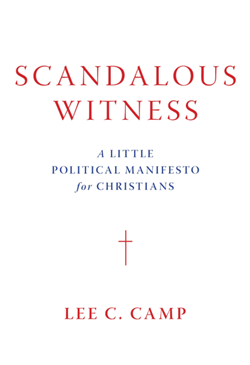How Then Shall We Respond?

The inclination of almost everyone in responding to a crisis or an injustice is to seize power and take control. Violence begets violence, power begets power, and injustices often beget injustices. Lee Camp’s Scandalous Witness proposes that Christians engage the state in a way that goes against the grain of seizing power but which, in the long run, will be transformative.
Camp’s proposal is not withdrawal from injustices but instead to work toward a deeper justice. To create an alternative where justice becomes a culture that is alive and active in forming persons into just persons.
Jesus said when the Spirit/Advocate/Paraclete comes…
he will prove the world wrong about sin and righteousness and judgment... about judgment, because the ruler of this world has been condemned.
I pray the Spirit of Pentecost will come upon us and prove the kosmos wrong about judgment becaues the ruler of this world – the powers and principalities and evil forces – has been condemned. Let us live into that condemnation.
Yes, for sure, outrage about the need for justice and judgment. Outrage about the evil now manifest. Outrage has its place and there needs to be outrage. Against injustice, against racism, and against systemic racism – both systemic and individual.
But there’s more. Outrage that stops with the satisfaction of outrage – amygdala stimulation – is not enough. Outrage that forms into a deeper justice transforms into cultures of peace and justice. Not the kind of outrage that ends and we all go back to where we were, but the kind of outrage that turns us toward transformational change – systemically and individually.
The words of former President Obama is what I mean:
But it falls on all of us, regardless of our race or station — including the majority of men and women in law enforcement who take pride in doing their tough job the right way, every day — to work together to create a "new normal" in which the legacy of bigotry and unequal treatment no longer infects our institutions or our hearts.
We need Presidential words of wisdom like these, not like the reckless and foolish ones we have heard from our current White House.
One part of the new normal must be the revision of laws that presently make prosecution against police brutality nearly impossible to succeed.
There is much that can be done. Much. Too much.
I will propose now, before the sketch of Camp’s last several theses, one small action for each white leader in America’s churches: this week have a discussion with an African American church leader or a Latin American church leader or an Asian American church leader and spend your time listening.
Listen in order to learn.
People with invisible power, which means people whose power is invisible to them, are unaware of their power and the disempowerment of others, and such persons need to listen long enough to perceive the imbalance of powers. For an equitable and just distribution of powers to all God’s people in all situations.
Now to Lee Camp’s excellent book, and he begins our post today with a thesis or proposition about power (or puissance):
The primary task of Christian community is not to dominate the political communities that do not accept basic Christian claims. Our task is not to dominate the debates between liberal liberals and the conservative liberals, to forcibly bring to bear some redacted form of Christian values on a system that knows not Christ. To pursue such dominance would, in fact, be a rejection of basic Christian faith and practice. We live in an out-of-control fashion precisely because we serve a Messiah who had no messianic complex but who first and foremost obeyed the will of God, even if it meant losing, even if it meant getting himself killed.

Our goal is not power but to witness and to embody that witness, and now quoting Camp again:
While our task is not liberal political puissance, is not to make things turn out right, is not to “make America great again,’ and is not to run the world, it is nonetheless a grand and majestic calling to the world: to bear witness to the world, even to the powers of the world, what the world was intended to be, and what it shall be when the consummation of the end of history comes.
Camp thinks the term “countercultural” misses the Christian calling:
The conventional wisdom among some Christian subcultures that Christianity is countercultural exhibits an ignorance regarding terms. More, it fails to say anything clarifying or constructive. Withdrawal from culture, further, is not simply a bad strategy; it is a logical fallacy. Similarly, charges of sectarianism often confuse more than they clarify and require careful analysis. Instead of a stance that is countercultural, a practice of percipient cultural discernment proves more constructive and clarifying.
He examines three approaches: a Christendom model (RCC more or less), a Lutheran model, and the Anabaptist model.
Then proposes that we engage by situation:
Christian social engagement must always be ad hoc. Given that we live between the time of the inauguration and the consummation of kingdom of God, there is no ideologically pure or utopian social arrangement among the nations for which we should strive. Any given social structure – no matter its strengths - is prone to fall under the sway of the powers of sin. Once one injustice is corrected with some new practice of equity, the new practice will, in turn, struggle withits own infidelities with regard to greed or pride or coercive force. Then a new corrective must be sought, and then again yet another. To continue ever to seek such new correctives – gracious and fair and equitable social practices – with patience and peaceableness and truth telling and without coercion or violence or disdain, this is what it means to be living as a Christian, as a Christian community, in the world prior to the consummation of the kingdom of God.
Jesus Creed is a part of CT's
Blog Forum. Support the work of CT.
Subscribe and get one year free.
The views of the blogger do not necessarily reflect those of Christianity Today.


















